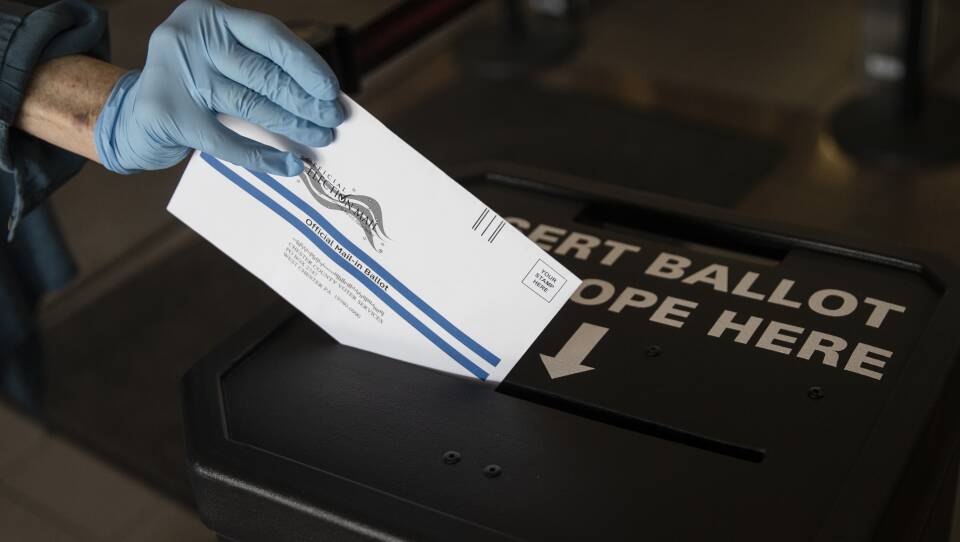It's Election Day, and some states continue to deal with questions around how and when votes will be counted. GBH Morning Edition host Joe Mathieu spoke with Northeastern University law professor and GBH News legal analyst Daniel Medwed to update us on some of the voting rights lititgation we've seen this election season. The transcript below has been edited for clarity.
Joe Mathieu: We spent a lot of time last week talking about Pennsylvania, the notorious swing state. Republicans are trying today to overturn a state court decision that would allow mail-in ballots to be received as late as this Friday as opposed to Election Day today. Has that been resolved, Daniel?
Daniel Medwed: Well, fortunately, yes — for the time being, at least. Here's what happened. The state Republican Party filed multiple requests with the U.S. Supreme Court to overturn that state decision, but the Supreme Court thwarted those attempts, basically saying it was too close to the election [and] didn't want to meddle in state voting law. What's alarming about the decision, though, at least for those of us who are really concerned about protracted post-election litigation, is that three justices — Alito, Gorsuch and Thomas — hinted that they thought this lawsuit had merit [and] that the Pennsylvania Supreme Court usurped the authority of the state legislature when it pushed back the deadline for receiving mail-in ballots. And some people think that's an overture, an invitation, or at least an opening for the state Republican Party to renew its lawsuit as soon as tomorrow. The Keystone State is really key to the post-election litigation puzzle, I think.
Mathieu: We talked about "naked ballots" last week. You mentioned that a state requires voters to submit mail-in ballots in a security sleeve. If you don't, they're naked; they don't count. We've seen estimates, Daniel, that could affect thousands of votes. What do you think of that?
Medwed: Well, that's right. In another decision, the Pennsylvania state Supreme Court said that those naked ballots are invalid; they won't be tabulated. And that could, as you point out, jeopardize up to 100,000 votes. That's the estimate I've seen. Now the good news is, if there's any, the Department of State in Pennsylvania — the equivalent of our secretary of state's office here in Massachusetts, which monitors and oversees the electoral process — [has] issued some guidance, and they've said to voters, if you think that there's a deficiency with your mail-in ballot, maybe it's a naked ballot or it has some other infirmity, there are options to cure it. You can come down to your polling place today and file a provisional ballot. The problem is that's cold comfort, of course, to people who might not even know about their deficiency. And evidently, counties across Pennsylvania are taking various approaches in terms of how effective they are and aggressive they are in alerting voters about potential problems.
Mathieu: I want to go to New Hampshire, Daniel, because over the past few years, as you well know, there's been a dispute surrounding the eligibility of college students to vote in New Hampshire. This comes up every two to four years. How has it been resolved?
Medwed: Well, I think we have some clarity finally on it in New Hampshire. Here's how it's supposed to work. Traditionally in most states, college students are allowed to vote in the place where they're attending school as long as they're domiciled in that state — they've attained residency status. And that's how it worked in New Hampshire for many, many years. That is until 2017, when state Republicans changed the law to basically make it much harder to achieve a domicile status. That led to an avalanche of litigation, which culminated in a state court decision in April 2020, where a New Hampshire Superior Court judge ruled that those Republican efforts were unconstitutional. Even though that decision is currently up on appeal, it is the law of the Granite State. College students may vote in this election in New Hampshire if they are otherwise eligible to vote. There are, of course, many complications stemming from the coronavirus epidemic because [many] college students in New Hampshire and elsewhere are learning remotely. And that does pose a fly in the ointment.
Mathieu: So how does that work for voting purposes? Remote learners are treated as living in New Hampshire, their home states or somewhere [else]?
Medwed: Well, here's how it works, or at least how we think it will work. So on the one hand, seniors, juniors and sophomores who were in residence in New Hampshire during the last academic year before the spring surge and the lockdown, they're treated under New Hampshire law as temporarily displaced and they're eligible to vote. They could send in their absentee ballot or, I guess, conceivably drive up to New Hampshire today to do it in person. But on the other hand, incoming freshmen who have never actually resided in New Hampshire and are learning remotely now are ineligible to vote, even if they otherwise are over the age of 18 and so on.




